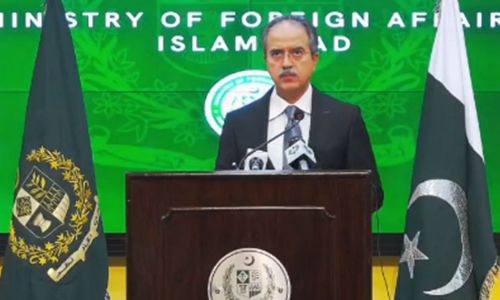IT is no secret that ties between Pakistan and the United States are going through a difficult phase. The recent visit to Pakistan of the US Deputy Secretary of State Wendy Sherman was illustrative of the challenges that bedevil this relationship.
In an interview during her visit to India before arriving in Pakistan, the US diplomat minced no words in saying that the US was looking at Pakistan only in terms of what is happening in Afghanistan and not in a broader sense of the relationship. She diluted her words in Pakistan but there is little ambiguity that Washington wants to deal with Pakistan in the context of what it can or cannot do to manage the Afghan situation. The noise emanating from Capitol Hill is hostile and the narrative finding traction in Washington is that Pakistan shares the major blame for US failures in Afghanistan.
Read: Afghan dispute overshadows desire for broad-based US-Pakistan ties
Talk of sanctions against Pakistan may not amount to much more than bluster at the moment, but the fact is that the gradual degradation of the bilateral relationship suits neither country. US President Joe Biden has driven home a point by not phoning Prime Minister Imran Khan. After Ms Sherman’s visit there are indications the call may materialise. But it will not alter the fact that interests are not aligning.
This must change.
Pakistan should realise, and acknowledge, that for the US, Afghanistan is the primary focus in this region and it will therefore expect Islamabad to commit to what it can do to address America’s major concerns. At this point, Pakistani politicians need to dial down their combative tone and think clearly. Counterterrorism measures are a high priority for the US. Its officials and elected representatives have time and again expressed fears about Afghan soil being used for the export of terrorism. They have also communicated that Pakistan can play an important role in facilitating these CT measures.
Mr Khan may have ruled out the prospects of providing the US any bases but perhaps there are other options that can be looked at in a spirit of accommodation. The US also expects Pakistan to persuade the Taliban to undertake the steps they had committed to in terms of greater participation of women in public life. So far the Taliban have displayed no flexibility and Pakistan is getting the flak for it because it has been at the forefront of asking the international community to engage with the Taliban.
However, Washington should also keep in mind that its failures in Afghanistan are primarily of its own making. Isolating Pakistan, or scapegoating it, is a flawed policy that will pay no dividends. At a time of major regional realignments, the US needs Pakistan as a partner in peace. It should not push it into a corner by refusing to acknowledge the major role that Pakistan is playing in the region today.
Published in Dawn, October 10th, 2021













































